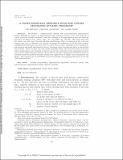A Computationally Efficient FPTAS for Convex Stochastic Dynamic Programs
Author(s)
Halman, Nir; Nannicini, Giacomo; Orlin, James B
Download13094774x.pdf (428.2Kb)
PUBLISHER_POLICY
Publisher Policy
Article is made available in accordance with the publisher's policy and may be subject to US copyright law. Please refer to the publisher's site for terms of use.
Terms of use
Metadata
Show full item recordAbstract
We propose a computationally efficient fully polynomial-time approximation scheme (FPTAS) to compute an approximation with arbitrary precision of the value function of convex stochastic dynamic programs, using the technique of K-approximation sets and functions introduced by Halman et al. [Math. Oper. Res., 34, (2009), pp. 674-685]. This paper deals with the convex case only, and it has the following contributions. First, we improve on the worst-case running time given by Halman et al. Second, we design and implement an FPTAS with excellent computational performance and show that it is faster than an exact algorithm even for small problem instances and small approximation factors, becoming orders of magnitude faster as the problem size increases. Third, we show that with careful algorithm design, the errors introduced by floating point computations can be bounded, so that we can provide a guarantee on the approximation factor over an exact infinite-precision solution. We provide an extensive computational evaluation based on randomly generated problem instances coming from applications in supply chain management and finance. The running time of the FPTAS is both theoretically and experimentally linear in the size of the uncertainty set.
Date issued
2018-06-11Department
Sloan School of ManagementJournal
SIAM Journal on Optimization
Publisher
Society for Industrial & Applied Mathematics (SIAM)
Citation
Halman, Nir et al. “A Computationally Efficient FPTAS for Convex Stochastic Dynamic Programs.” SIAM Journal on Optimization 25, 1 (January 2015): 317–350 © 2015 Society for Industrial and Applied Mathematics
Version: Final published version
ISSN
1052-6234
1095-7189